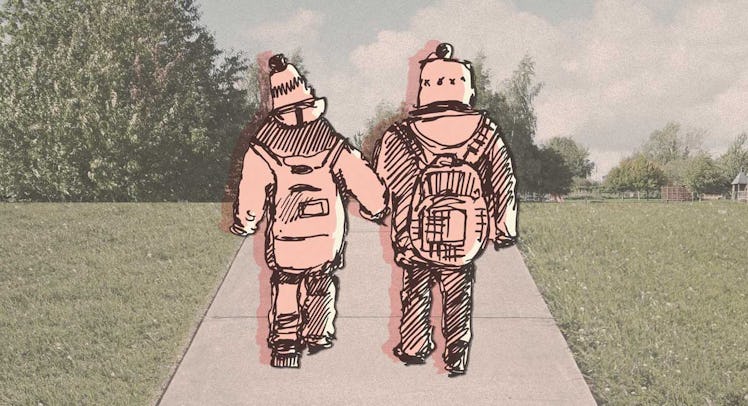Kids Will Get Bullied By Their Friends. Don’t Panic. Take the Long View.
Kid relationships and adult relationships don't begin or end in the same ways.

After one too many inequitable Pokemon card trades — Incineroar for Scizor was the straw that broke the Camerupt’s back — my six-year-old son realized Carter was not his friend. After having the plot of It lovingly recited, again, despite protestations, he realized Connor was not either. That’s not to say these boys were never friends. They were. They had playdates. They went to each others’ birthday parties I spent over $100 on presents over the years and saved their parents’ contacts. But things change and, gradually, kids start to notice that.
“Connor and Carter were mean to me again today,” my son informed me recently. “I don’t think they’re my friends.”
READ MORE: The Fatherly Guide to Socializing Kids
It was tragic to watch my son come to terms with the reality that friendships are not forever. But I also knew he was probably right and had no desire to exacerbate the issue by gaslighting the kid. Thus began the long and uncomfortable process of consciously uncoupling, unfriending, or whatever you want to call it when little boys go their owns separate ways.
For parents, morning drop off is like launching your child into suborbital flight. Once kids enter a classroom, they are beyond your grasp. Like ground control, you must rely on reports to find out what is going on up there. But the connection is hinky. There’s static on the line. This makes parenting a horrifically stressful gig and also means that we must trust our kids. I had to, in this case, trust my son to do something complicated: alter a relationship to suit his own needs. It was a big ask and I wanted to step in, but I could see no way to do so productively.
Hoping to come up with some means of involving myself — largely for my own comfort — I spoke to Dr. Robert Zeitlin, a psychologist and parenting coach in Haverford, Pennsylvania. And I was happy I did because I had accidentally transposed my son’s social situation onto adult actors. I wasn’t thinking like my son or Connor or Carter.
“What I tell parents,” he said, “is that they’re in the stands. But their kids are on the race track, zooming around, lap after lap. It’s a totally different perspective.” What does that mean? Life comes at kids so fast it’s unwise to think about social changes as permanent or get married to specific narratives. Maybe Connor was being mean and maybe he’s at a stage where he struggles to understand other kids’ emotions. Maybe my son is at a stage when he fails to communicate his own emotions coherently (there is evidence to support this and I wouldn’t readily cop to crying all night in terror either)? It’s hard to say, but, as Zeitlin points out, whatever the circumstance might be, it’s likely to change rather rapidly.
Zeitlin’s advice seems easy to heed and sounds simple enough. But I found it impossible to parse out my own feelings about friendship from what he was going through. As Daniel Siegel and Mary Hartzell write in Parenting from the Inside Out, “When we become parents, we bring with us issues from our own past that influence the way we parent our children… These intense states of mind impair our ability to think clearly and remain flexible and affect our interactions and relationships with our children.”
I flashed back to McKinley Elementary school, with its worn carpet on the floor and the smell of Borax desk cleaner in the air, and to my Marvel Skybox trading cards in their neat plastic sleeves. I remember trying to woo Mike Predeger and Jim Topper into friendship by gifting them cardboard rectangles and the way they slipped them into the pockets of their Z. Cavaricci jeans then walked to recess together. It’s hard not to remember hurt. We’re wired that way.
But this, this is the fog of the stands, the fuzziness of the nosebleed seats. And what my son needed, what my son needs, isn’t reverie but reality.
In the end, there’s little I can do for him anyway. What I had to offer was my perspective. I could tell him what it looked like from where I was sitting. So I advised him not to trade cards he wanted to keep and to speak up when someone is being cruel. I think I did well. I think he got it. I don’t think it could conceivably have mattered less.
The next day, he came home jubilant. He had gotten his Incineroar back and geeked out about Trollhunters. He was running with friends again, at least for one more lap.
This article was originally published on